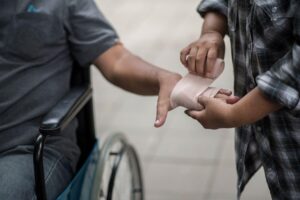 When the weather cooperates, Dr. Andrew Swiderski will rush from his office at Open Door Family Medical Center in Ossining, wearing a mask, gown and gloves, to meet his young patients and their parents outside the building.
When the weather cooperates, Dr. Andrew Swiderski will rush from his office at Open Door Family Medical Center in Ossining, wearing a mask, gown and gloves, to meet his young patients and their parents outside the building.
The exam itself may take place in the doorway of an empty store or, if it’s a windy day, in the parking lot, often with the child never leaving his or her car seat. On days that are less cooperative, Dr. Swiderski tries to schedule his pediatric appointments in the mornings and meets his patients at an entrance designated for well-care. At a time when most families’ biggest concern is exposure to the virus, these types of visits help keep contact to a minimum.
“If I have a patient with a diaper rash and the parents send me a photo and I can see what’s going on, that may be good enough, and they won’t have to come to the office,” he said. “But if I need to look in the patient’s eyes or lungs to see what’s going on, or weigh a newborn or see if they have jaundice and need their bilirubin checked, this can’t be done through a virtual exam.”
Similarly, if young children need to be vaccinated – with a number of shots required from two months to 15 months – it can only be done in person.
Open Door provides more than 300,000 patient visits and serves over 60,000 people annually at its six sites in Westchester and Putnam counties, many of whom might not otherwise have access to care. A majority of its patients live at or below the federal poverty line.
During the pandemic, most “well-children” visits at the federal qualified health care center can be discussed in virtual telephone or video conferences, with the patient never leaving home. Dr. Swiderski said one of his priorities is to keep young patients and their families out of harm’s way at this time.
“Most parents are wary and don’t want to come in, and those that we need to see we try to get out quickly,” he said. “We make sure that everyone, including children over the age of two, wears a mask. We can’t neglect a whole cohort of infants and young children with ear or sinus infections, or create a whole new pandemic by not giving them their shots.”
Several local organizations and community members have donated masks for patients to take home.
Not a Childhood Pandemic
Based on available evidence, few children have exhibited severe symptoms of Covid-19. Dr. Swiderski said those pediatric patients who have tested positive for Covid-19 have generally exhibited cold-like symptoms such as mild fevers, runny nose and coughing.
During a time of school closings, lockdowns and social distancing, he’s also seeing much less in the way of typical childhood illnesses.
“It’s kind of amazing, but during a normal winter season, you’d see a lot of kids with bad asthma,” he said. “We’re not seeing that. With everyone hunkered down at home, and not in the petri dish of school or day care, kids are not getting sick as much.”
The pediatrician devotes a day each week to treating adults with Covid-19 at Open Door. This continues to be the vast majority of the health center’s patients.
“It’s not a pediatric pandemic,” said Dr. Swiderski. “Worldwide, generally speaking, they don’t get as sick as adults, and only about two percent of the positive cases of Covid-19 are pediatric. Children, however, with underlying medical conditions and special healthcare needs could be more susceptible to more severe illness.”
Parents, he said, will go to all ends to protect their children from exposure. This can be a problem with Open Door patients, many of whom don’t have the option of quarantining at home in separate rooms. This means, he said, that some families have sent young children to live with grandparents or other relatives. Overall, he said, he has been impressed by his patients’ compliance in staying at home, maintaining social distance, washing hands regularly, and wearing masks.
Home Visits
When families all suffer from symptoms of Covid-19, Dr. Swiderski and other members of Open Door are not above going the extra mile. This may mean personally delivering food and medicine to those patients racked by the virus.
“If one person has it and the entire family is quarantined, how will they get medication or food?” he said. “The parents of one patient, who is a high needs kid, both had Covid-19, and the mom called me to say ‘We’re running out of food and he’s not drinking. What should I do?’ I was worried about him becoming dehydrated. So after she told me he likes strawberry, I went to the grocery store and bought drinks and yogurt with strawberry. When I got to their home, no one could answer the door because no one could get out of bed. So, I left the bags in front of the door for them.
“When you’re computer savvy and speak English, you can call for deliveries. Accessibility is key. But without it, it can become very difficult.”
The Covid-19 pandemic has amplified the barriers Open Door patients face staying healthy. Few have workout equipment at home and gyms are closed so they don’t exercise.
“I tell them this thing is not floating in the air, and if they take proper precautions, they should be out there walking or hiking,” he said. “Home schooling is a whole other issue. Well-educated families will continue to read books to their children, but with a more underserved population there are fewer resources at home. They may even have trouble accessing online school lessons and activities may not be readily available. It’s a trying time.”





